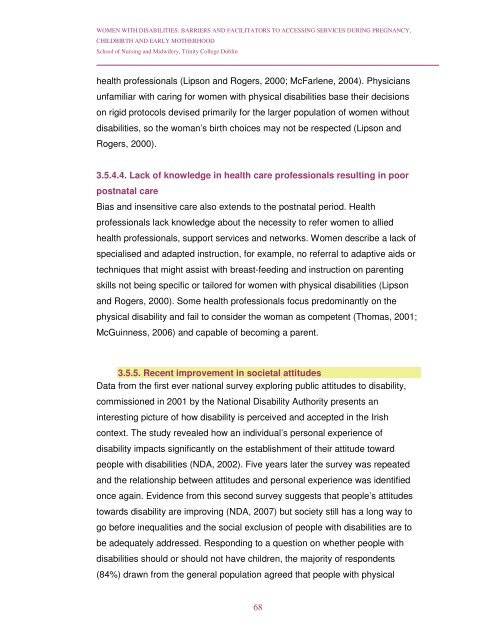Women with Disabilities: Barriers and Facilitators to Accessing ...
Women with Disabilities: Barriers and Facilitators to Accessing ...
Women with Disabilities: Barriers and Facilitators to Accessing ...
You also want an ePaper? Increase the reach of your titles
YUMPU automatically turns print PDFs into web optimized ePapers that Google loves.
WOMEN WITH DISABILITIES: BARRIERS AND FACILITATORS TO ACCESSING SERVICES DURING PREGNANCY,CHILDBIRTH AND EARLY MOTHERHOODSchool of Nursing <strong>and</strong> Midwifery, Trinity College Dublinhealth professionals (Lipson <strong>and</strong> Rogers, 2000; McFarlene, 2004). Physiciansunfamiliar <strong>with</strong> caring for women <strong>with</strong> physical disabilities base their decisionson rigid pro<strong>to</strong>cols devised primarily for the larger population of women <strong>with</strong>outdisabilities, so the woman’s birth choices may not be respected (Lipson <strong>and</strong>Rogers, 2000).3.5.4.4. Lack of knowledge in health care professionals resulting in poorpostnatal careBias <strong>and</strong> insensitive care also extends <strong>to</strong> the postnatal period. Healthprofessionals lack knowledge about the necessity <strong>to</strong> refer women <strong>to</strong> alliedhealth professionals, support services <strong>and</strong> networks. <strong>Women</strong> describe a lack ofspecialised <strong>and</strong> adapted instruction, for example, no referral <strong>to</strong> adaptive aids ortechniques that might assist <strong>with</strong> breast-feeding <strong>and</strong> instruction on parentingskills not being specific or tailored for women <strong>with</strong> physical disabilities (Lipson<strong>and</strong> Rogers, 2000). Some health professionals focus predominantly on thephysical disability <strong>and</strong> fail <strong>to</strong> consider the woman as competent (Thomas, 2001;McGuinness, 2006) <strong>and</strong> capable of becoming a parent.3.5.5. Recent improvement in societal attitudesData from the first ever national survey exploring public attitudes <strong>to</strong> disability,commissioned in 2001 by the National Disability Authority presents aninteresting picture of how disability is perceived <strong>and</strong> accepted in the Irishcontext. The study revealed how an individual’s personal experience ofdisability impacts significantly on the establishment of their attitude <strong>to</strong>wardpeople <strong>with</strong> disabilities (NDA, 2002). Five years later the survey was repeated<strong>and</strong> the relationship between attitudes <strong>and</strong> personal experience was identifiedonce again. Evidence from this second survey suggests that people’s attitudes<strong>to</strong>wards disability are improving (NDA, 2007) but society still has a long way <strong>to</strong>go before inequalities <strong>and</strong> the social exclusion of people <strong>with</strong> disabilities are <strong>to</strong>be adequately addressed. Responding <strong>to</strong> a question on whether people <strong>with</strong>disabilities should or should not have children, the majority of respondents(84%) drawn from the general population agreed that people <strong>with</strong> physical68
















